Julian Assange: Little room for compromise
- Published
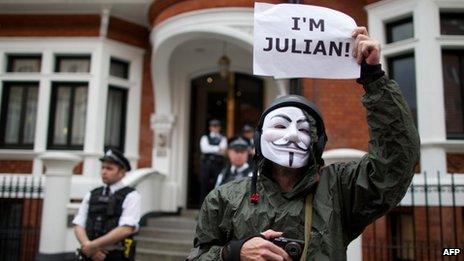
Supporters of Julian Assange have been vocal outside the Ecuadorean Embassy in London
When first Julian Assange sought sanctuary in Ecuador's embassy in London two months ago, he had jumped bail and was delaying the day when he might be extradited to Sweden to face questioning over serious sexual assault accusations.
At the time the government in Quito was careful to suggest it did not want to spoil relations with Britain. The Foreign Office in London, too, insisted it was looking for a negotiated way out of the log-jam.
But what has become clear this week is that there is not much room for compromise. Though the UK government says it wants to continue talks, it says flatly that it will not guarantee Mr Assange safe passage out of the country and will not compromise over its obligation to extradite him to Sweden.
Britain "had not given one inch", according to the Ecuadorean Foreign Minister, Ricardo Patino, and what had been a "friendly dialogue" had turned into a "threat" and an "explicit type of blackmail".
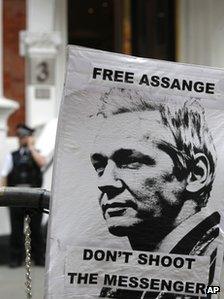
It is unclear how Mr Assange will leave the embassy without getting arrested
What incensed Ecuador particularly was Britain's suggestion it might try to use a little-known law from 1987 to revoke the diplomatic status of the Ecuador Embassy building in London, to let in British police to arrest Mr Assange.
If it worked, this could be an easier way out, according to one British diplomat, than the "nuclear option" of breaking off diplomatic relations with Ecuador entirely.
But even raising the possibility of sending police into the embassy has proved a controversial move by Britain.
Leaving aside the legal debates about whether this 1987 British law could really trump the long-standing international protections enshrined in the Vienna Convention to safeguard the immunity of foreign diplomats and embassies worldwide, it could also set a worrying precedent: which other countries might then follow suit to use the pretext of catching criminals in order to storm into foreign embassies sheltering dissidents?
'Anti-imperialist' president
Though the Foreign Office's counter-argument would be: how could it stand by and allow a foreign embassy in London to be used for non-diplomatic purposes to shelter a potential criminal who had jumped bail, without taking some action?
More immediately, it is already clear that the rift between Britain and Ecuador has deepened.
In Quito the foreign minister now argues that Mr Assange is a potential "victim of political persecution", because of his defence of freedom of speech and press through his Wikileaks publications, and it is Ecuador's duty to protect him and make sure his fears of being extradited to the United States, and possibly facing long incarceration (like Bradley Manning) - or even the death penalty - are not realised.
Meanwhile, Britain has been accused of treating Ecuador like a colony.
No doubt the Ecuadorean president sees the whole saga as an opportunity to burnish his "anti-imperialist" credentials among his colleagues. Ecuador has already called for a meeting of fellow Latin American countries to consider an appropriate response.
Given that Britain had been trying to tread delicately in Latin America, to avoid its quarrel with Argentina over the Falklands Islands spreading across the continent, this is bad timing, to say the least.
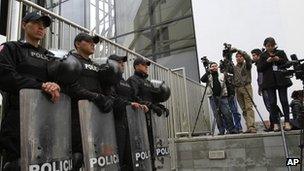
From London to Quito, police and journalists are poised for the next step in the Assange tale
On the other side, Sweden has been swift to line up behind Britain and voice its displeasure with Ecuador, summoning the ambassador to Sweden to the Foreign Ministry in Stockholm to call it "unacceptable" for Ecuador to block the due process of a Swedish investigation.
Meanwhile, the question remains: how long might Mr Assange stay holed up in the Ecuadorean Embassy, granted asylum, but unable to leave without getting arrested?
There seems little practical hope of smuggling him out. In theory he could be there for a long time.
Chinese dissident Fang Lizhi, who sought refuge in the US Embassy in Beijing in 1989, was there a year.
The Hungarian cardinal who found sanctuary in the US Embassy in Budapest after the anti-Communist uprising there in 1956 stayed 15 years, until 1971. And there are two surviving members of the Derg in Ethiopia still in the the Italian embassy in Addis Ababa, where they have been since 1991.
It is perhaps with that in mind that one British diplomat noted in apparent frustration that it would be impossible and far too costly to mount a 24-hour police guard outside the Ecuadorean Embassy indefinitely, and some other solution to the impasse would need to be found.
What began as a tricky negotiation has now become a full-blown row, involving not just Britain and Ecuador, but also Sweden and the United States.
And the higher the political temperature is raised in this complex, twisting story of Julian Assange's status and fate, the harder it may be to find a diplomatic solution.
- Published16 August 2012

- Published16 August 2012
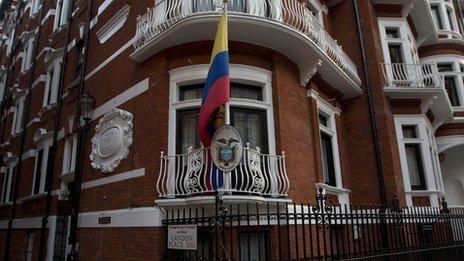
- Published20 June 2012
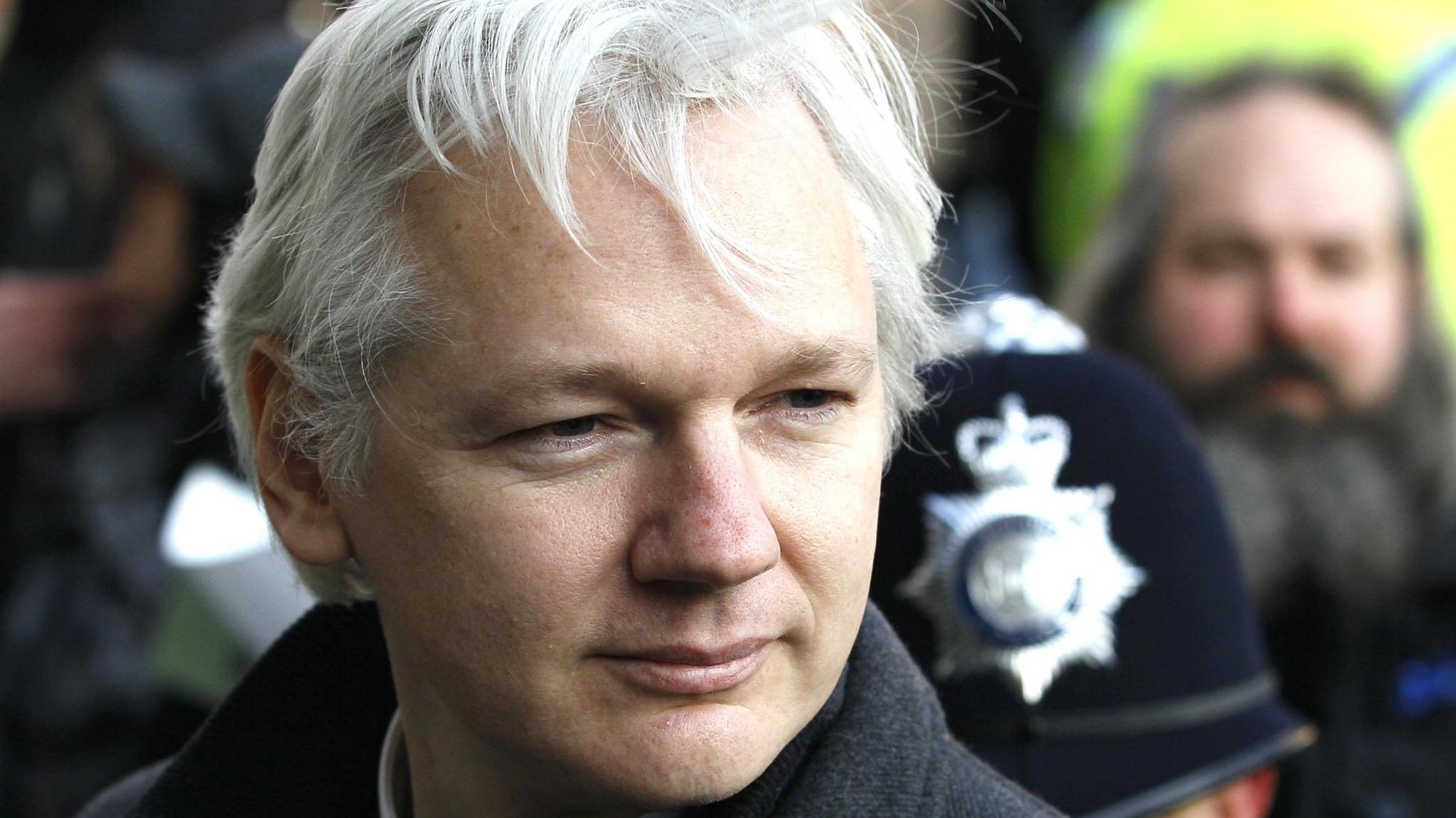
- Published26 June 2024
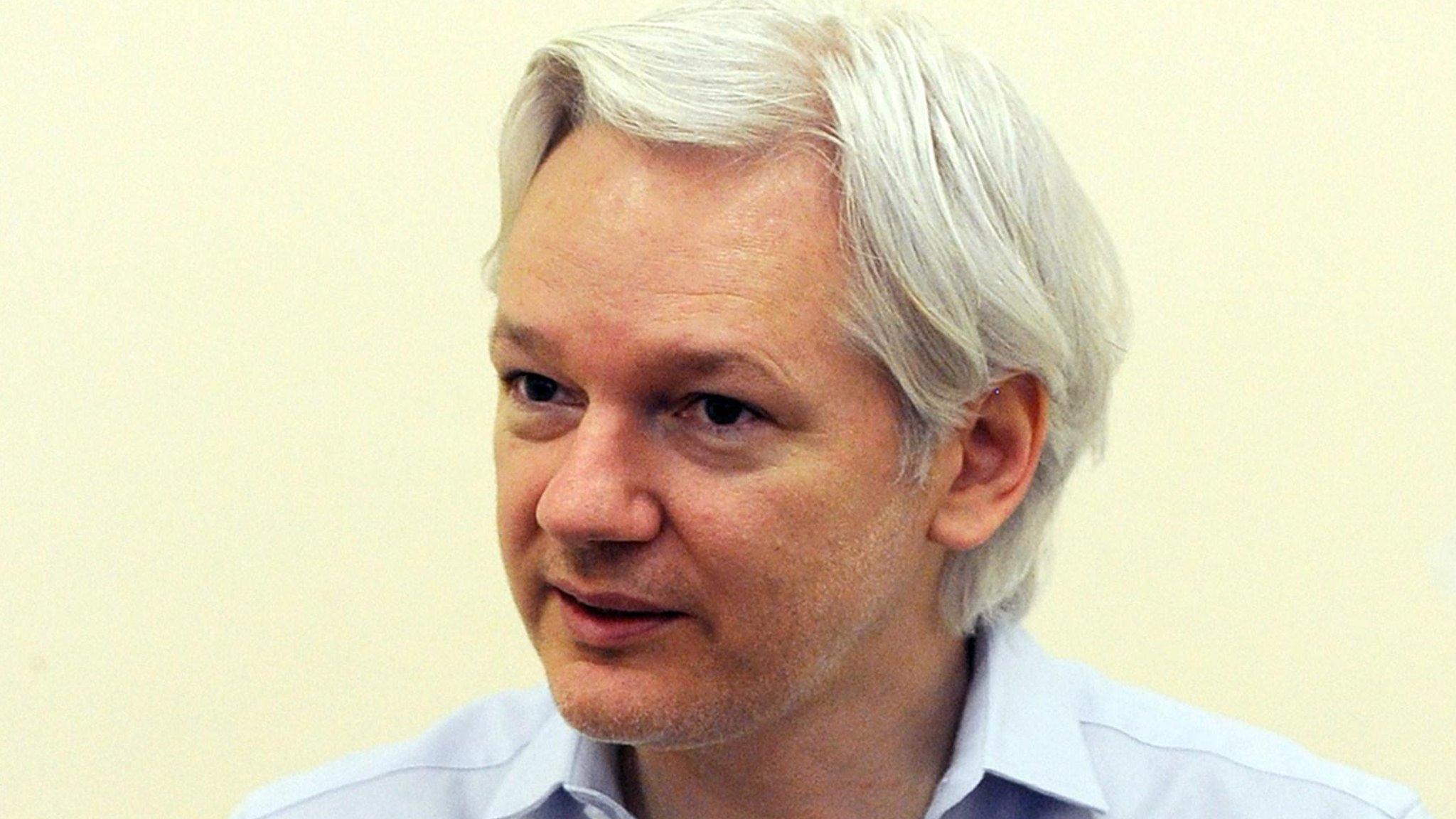
- Published2 May 2012
